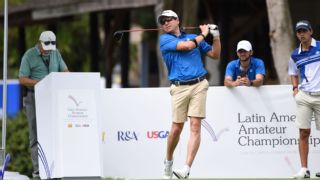|
LA ROMANA, Dominican Republic -- Before he boarded a plane from his home country of Bolivia to the 2022 Latin American Amateur Championship, Camilo Avila was making the rounds in his delivery car, dropping off empanadas and other Colombian snacks, while letting his customers know that he wasn't going to be around the following week. Avila, who played golf at the University of Texas at Arlington, made the decision a few years ago to be realistic about his future, give up his golf dream and find a day job. As a broadcasting major, he spent some time calling soccer games, jumping around from local radio station to station, from internship to internship, hoping something would stick. The COVID-19 pandemic solidified his reality: In Bolivia, he was unlikely to find a permanent broadcasting job. + How to watch the Latin America Amateur Championship on ESPN "One day, I turned to my mom and asked her how hard she thought it would be to make empanadas, croquetas and petacones," the 25-year-old Avila said. "She told me it was hard work, but I could do it." So Avila got to cooking and freezing the Colombian snacks, selling them through social media and delivering them himself around Santa Cruz in Bolivia. Now, the business has grown; Avila has his regulars, and he has made his way back to golf, including developing a routine that allows him to fit the sport around his entrepreneurship. "While the corn cooks and cools, I can't do anything, so I go practice in the mornings," Avila said. "And in the afternoon, I map out my deliveries to finish close to the club so I can go play after I'm done." All that work has led to Avila's second LAAC appearance, which begins Thursday at Casa de Campo's Teeth of the Dog course (11 a.m. ET, ESPN2). Avila is not the only one here who has to think about more than his score this week; the winner gets an automatic bid to the Masters, The Open and U.S. Amateur. While this event brings together some of Latin America's best young talent, it also acts as a destination for those amateurs who have lives outside the sport they have to balance. "I try to practice every day, but it's hard," Marcel Olivares, a 51-year-old Dominican amateur and former tennis professional who runs a travel packages business out of Punta Cana airport. "But when there's a tournament like this, I try to get ready and invest more time." Alejandro Villavicencio is a 42-year-old businessman from Guatemala who had a five-year professional stint. He jokes that he's able to play only as much golf as his wife allows. Her family owns a restaurant chain, Los Ranchos, that Villavicencio helps run. Villavicencio also has a telecommunications business that services phone towers. So, when courses shut down during the pandemic, he immediately went to his warehouse, took out a patch of turf from a provider and set up a putting green on his balcony. "At the very least, I was sharpening my putting game," Villavicencio said. Between both jobs, and his kids playing soccer and golf, he hasn't had much time to devote to practicing. On a good week he's able to practice Fridays and play Saturdays. "It gets complicated, dividing the time for work, family and golf," he said. Panama's Omar Tejeira Jaen -- the second-highest ranked player in the field this week -- has found a unique balance. On Monday, as he got in from Panama, he grabbed lunch and answered emails for his company, an online concierge service for six countries in Latin America.  This is Tejeira Jaen's first LAAC, but it's not his first time at Casa de Campo's Teeth of the Dog course. The 31-year-old played here when he was a professional before suffering a cervical injury that ended his pro career. He's still playing golf, but now, he's having to fit in range sessions and nine-hole rounds around his work day -- not just at home, but at this tournament, too. As the head of a newer company, Tejeira Jaen said that once he signs his scorecard and gets a meal, he'll dive into work mode, check emails and monitor his business. It's his reality, but accepting it has allowed him to develop a strategy that has helped him on the course, too. Before, the challenge was not letting the stress of staying pro, winning money or gaining sponsorships get in the way. Now, it's ensuring he can flip his focus from golf to work and vice versa effectively. "I think having to create those mental boundaries has been a benefit to me," Tejeira said. "When I'm on the course, it makes you feel that you can separate things, you can separate bad shots from good, good holes from bad." Despite the differences in jobs and approaches, what keeps some of these players on the course is an itch they can't help but scratch, one that goes beyond winning and losing. After being a professional for some time or trying to be, some have found a renewed romance with the game once they are away from the pressure of high-stakes competition. Don't get them wrong, they still want to do well in this tournament. But the joy and satisfaction comes from the path they take to get here more than any single result. "I can tell you, once I stopped playing pro and started playing amateur, combining work with golf, I think for me, personally, it has been an enriching experience," Tejeira Jaen said. "I think I am 10 times the player I was as a professional." Avila, in particular, gets emotional trying to explain the realization he came to during the pandemic. The sensation he was getting from playing again, from realizing the privilege he had to play, opened his eyes. "I found out how important it is in my life because it's my safe space," Avila said. "I told people in Bolivia, my family, you have no idea how badly I need this week. Golf is everything."
|

